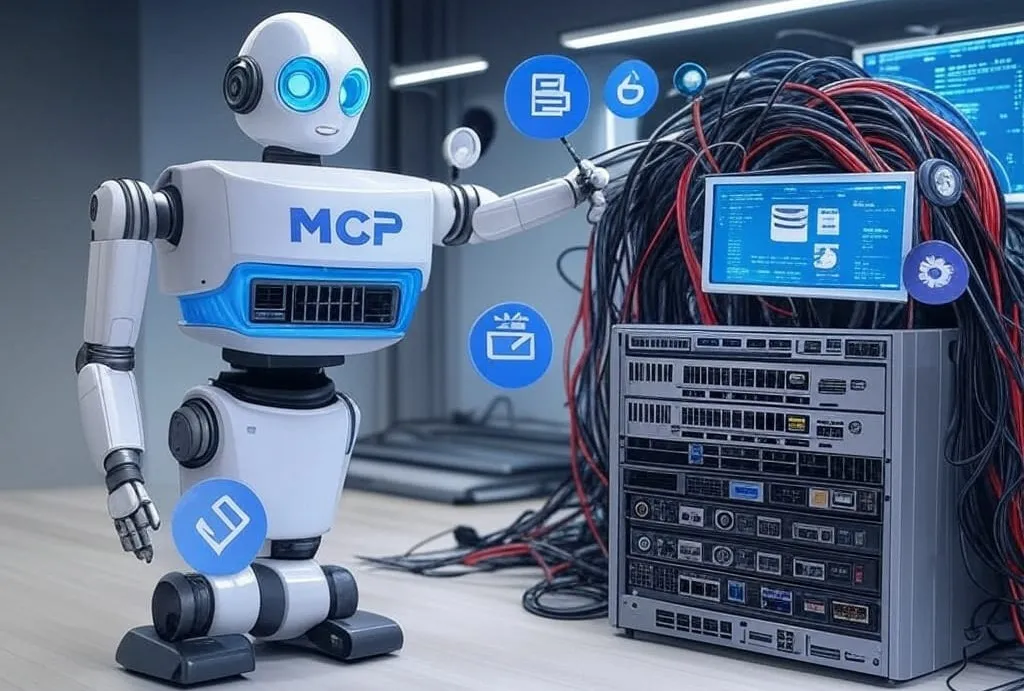Main Advantage of MCP Servers:
MCP servers make it super easy for AI to connect to all kinds of data and tools without needing complicated custom code every time.
Imagine MCP servers as a universal adapter—like the one charger that works with all your devices.
They let AI "talk" to different apps, websites, or databases in a simple, standard way. This means the AI can quickly get the info it needs to be smarter and more helpful, without developers having to build something new for every connection. It’s a hassle-free way to make AI more powerful and useful!
What is an MCP Server?
MCP servers are systems designed to provide context, tools, and prompts to AI clients, such as large language models (LLMs) like Claude. They operate through a client-server architecture, exposing data sources, tools, and functionalities via a standardized protocol developed by Anthropic. This allows AI assistants to securely access real-time information, external APIs, databases, and other resources.Applications of MCP ServersMCP servers have a wide range of applications, as highlighted in the thread and web results. Here are some key use cases:
- Enhancing AI Capabilities with External Data and Tools
- Resources: MCP servers can expose file-like data (e.g., API responses, documents, databases) to AI clients, enabling real-time access to information. For example, a server could provide weather data, financial metrics, or document contents to an LLM like Claude.
- Tools: They allow LLMs to execute specific functions or tools with user approval. Examples from the web results include:
- A weather server with tools like get-alerts and get-forecast to fetch real-time weather data (Web Result 1).
- A Redis MCP server for caching or key-value storage, interacting with systems like AWS Memory DB (Web Result 2).
- An AWS S3 server for fetching objects like PDF documents (Web Result 2).
- Prompts: MCP servers can provide pre-written templates to guide users in accomplishing specific tasks, enhancing the AI’s ability to assist effectively.
- Integration with Development Environments
- Cline, as described in the X thread, uses MCP servers to build plugins and applications within integrated development environments (IDEs). Developers can create MCP servers in under 15 minutes using Cline’s guided process, which includes planning, implementation, and testing phases.
- The .clinerules file and Cline’s 3-step development protocol (Planning, Implementation, Testing) streamline the creation of production-quality MCP servers for JavaScript or other projects (Post 1898101473676013575, 1898101719994974242).
- Monetization and Marketplace Distribution
- MCP servers can be monetized by offering free tiers (e.g., 5-10 requests) and premium subscriptions (e.g., $20/month for increased limits), as suggested in the thread (Post 1898101848340594844).
- Developers can submit their MCP servers to Cline’s MCP Marketplace for distribution to thousands of developers, establishing a position in a growing, minimally competitive market (Post 1898101860034355480, Web Result 3).
- Specific Industry Applications
- Data Exploration: An MCP server can autonomously explore CSV datasets, providing intelligent insights with minimal effort (Web Result 2).
- Web and API Integration: Servers like Search1API enable web search, crawling, and sitemap generation, while ClickHouse integration allows querying databases (Web Result 2).
- Arbitrary Code Execution: Platforms like Riza use MCP for tool-use and code execution, though with caution due to security risks (Web Result 2).
- Secure AI-Powered Applications
- MCP servers maintain secure 1:1 connections with clients inside host applications (e.g., Claude Desktop), ensuring data privacy and controlled access to external resources (Web Result 0).
- They are particularly useful for LLMs that lack native capabilities to fetch real-time data or execute complex operations, bridging the gap with external tools (Web Result 1).
How MCP Servers Work
- Architecture: MCP servers use a simple client-server model, exposing data and tools through a standardized protocol. They connect securely with clients like Claude for Desktop or custom-built clients (Web Results 0, 1).
- Development Process: As outlined by Cline, developers define requirements, implement the server (e.g., using npx @modelcontextprotocol/create-server), and test thoroughly before deployment (Posts 1898101601820459281, 1898101836311298096).
- Community and Ecosystem: The MCP ecosystem includes community-developed servers (e.g., on GitHub), though some are untested and should be used cautiously. Anthropic and Cline provide official resources and marketplaces to ensure security and stability (Web Results 2, 3).
Examples from the Thread and Web Results
- Cline’s MCP Server Building: The thread describes building an MCP server with Cline, starting with a .clinerules file, using APIs/services, and testing for reliability before monetization (Posts 1898101461806182495, 1898101836311298096).
- Weather Server Tutorial: Web Result 1 details building a weather MCP server with tools like get-alerts and get-forecast, connecting it to Claude for Desktop.
- Marketplace Submission: Web Result 3 explains how developers can submit MCP servers to Cline’s marketplace, making them discoverable and installable with one click.
Potential for Growth
- The MCP economy is described as a “rare, wide-open market with minimal competition and huge potential” (Post 1898101392461697078). Early adopters who build quality MCP servers can establish market positions before competition increases, leveraging Cline’s tools and marketplace.
Considerations
- Security: Some community MCP servers execute arbitrary code or handle sensitive data (e.g., Python code, AWS S3), requiring careful vetting and caution (Web Result 2).
- Testing: Thorough testing is critical for reliability and monetization, as Cline blocks completion until all tools are verified (Post 1898101836311298096).
- Accessibility: While Claude for Desktop is a common host, Linux users may need to build custom clients (Web Result 1).
In summary, MCP server applications are versatile, enabling AI systems to access external data, tools, and prompts securely and efficiently. They’re particularly valuable in development, data integration, and monetization, with Cline and Anthropic driving their adoption through tools, tutorials, and marketplaces. If you’re interested in a specific application or need help building one, let me know, and I can dive deeper!




